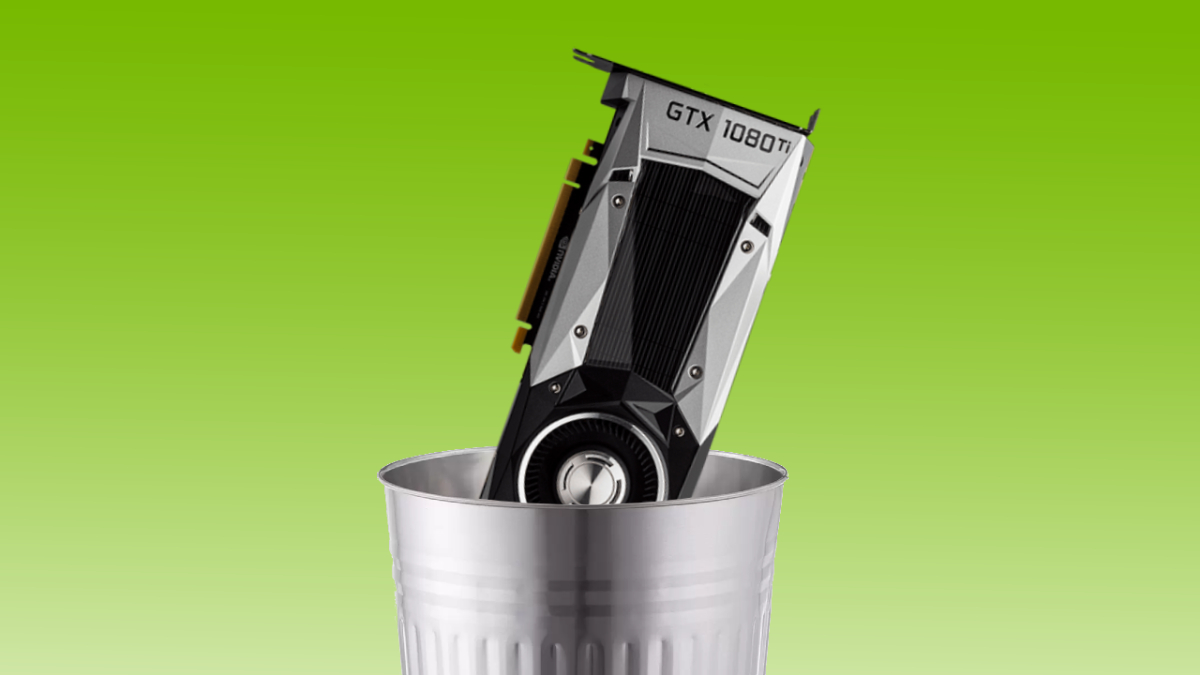Nvidia sentences GTX 1080 Ti to die a heartbreaking slow death as architecture support “frozen”

Table of Contents
Nvidia’s upcoming next-gen GPUs based on the Blackwell architecture are set to bring game-changing improvements, particularly in AI features and AI-driven enhancements. Team Green has confirmed that the RTX 50 series won’t be the only beneficiary of the new DLSS 4 technology. Instead, all RTX GPUs will see a performance boost in some way or another. This is great news for those still holding on to an RTX 20 series or newer GPU, but the bad news is for GTX card owners, as Nvidia is preparing to put the final nail in the GTX-era coffin.
If you own an older Nvidia graphics card, the release notes for CUDA 12.8 state that “architecture support for Maxwell, Pascal, and Volta is considered feature-complete and will be frozen in an upcoming release.” This means that affected Nvidia GPUs will no longer receive new features through future updates, though basic security fixes will likely continue via driver updates.
Prime Day is finally here! Find all the biggest tech and PC deals below.
- Sapphire 11348-03-20G Pulse AMD Radeon™ RX 9070 XT Was $779 Now $739
- AMD Ryzen 7 7800X3D 8-Core, 16-Thread Desktop Processor Was $449 Now $341
- ASUS RTX™ 5060 OC Edition Graphics Card Was $379 Now $339
- LG 77-Inch Class OLED evo AI 4K C5 Series Smart TV Was $3,696 Now $2,796
- Intel® Core™ i7-14700K New Gaming Desktop Was $320.99 Now $274
- Lexar 2TB NM1090 w/HeatSink SSD PCIe Gen5x4 NVMe M.2 Was $281.97 Now $214.98
- Apple Watch Series 10 GPS + Cellular 42mm case Smartwatch Was $499.99 Now $379.99
- ASUS ROG Strix G16 (2025) 16" FHD, RTX 5060 gaming laptop Was $1,499.99 Now $1,274.99
- Apple iPad mini (A17 Pro): Apple Intelligence Was $499.99 Now $379.99
*Prices and savings subject to change. Click through to get the current prices.
GeForce gaming driver support is still there, but not for long
While this doesn't immediately affect GeForce gaming driver support for these GPUs – since Maxwell and Pascal are still included in the GeForce RTX series driver support list – the end of full support for these three architectures is approaching. Nvidia hasn't provided an exact timeline for when it will drop support for Maxwell, Pascal, and Volta GPUs in gaming drivers. The current CUDA toolkit still supports these architectures, but they won't receive future updates. Once the transition happens, the only GTX-series GPUs with full support will be the GTX 16-series, which is based on the RTX 20-series’ Turing architecture.
Not ready to say goodbye to the legendary GTX 1080 Ti
Nvidia set new standards with the three GPU architectures now nearing the end of their lifecycle, whether in raw performance, energy efficiency, or advancements in mobile GPUs. While each made significant strides in its time, the GTX 1080 Ti continues to be regarded as one of the greatest GPUs of all time. Even today, it holds up in budget builds, running modern AAA titles with ease if you don’t need features like Ray Tracing, and popular creators like GamersNexus still highlight just how powerful the GPU is.
The Maxwell series, first introduced in the GTX 700 lineup with the GTX 750 Ti and GTX 750, delivered some of the most power-efficient entry-level GPUs of its time. It was followed by GPUs like the GTX 980 and GTX 970, which set new benchmarks for power efficiency. However, it was Pascal, which cemented Nvidia's dominance in gaming GPUs. It was the company's first architecture to use TSMC's 16nm FinFET+ technology, doubling the density of Maxwell's 28nm node. As a result, the GTX 1080 Ti was, on average, 60% faster than the GTX 980Ti at just $700.
Even when Nvidia launched the RTX 20 series, the GTX 1080 Ti wasn't overshadowed and often came close to the RTX 2080, which was almost $50–$100 more expensive. But now, the 1080 Ti is more than seven years old, and as Nvidia shifts toward an AI-driven gaming future, it makes sense to phase out support for older GPUs. On top of that, with competitively priced options like the RTX 5070 coming soon, the upgrade path is more appealing than ever. However, raw performance isn't what it was seven years ago. Perhaps AI-driven gaming is the future, as Nvidia’s Bryan Catanzaro claims, but someone still running a GTX 1080 Ti may feel inclined to disagree.

